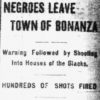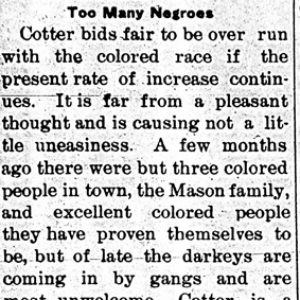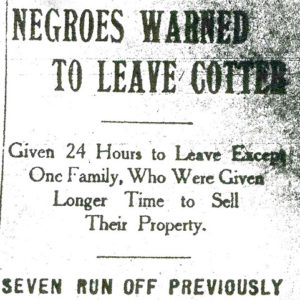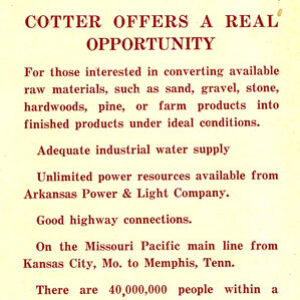calsfoundation@cals.org
Cotter Expulsion of 1906
In 1906, white residents of Cotter (Baxter County) expelled all of the town’s African-American population, save for a single family of three people. (The population had not been great.) Although the precipitating event was a fight between two black men, local newspapers had been predicting, and even advocating for, such an expulsion long before that fracas occurred. Afterward, Cotter remained a “sundown town.”
The area that is now Baxter County had black residents before the Civil War. For example, Orrin L. Dodd, located in what is now Mountain Home (Baxter County), owned thirty slaves by the 1860 census. Too, there was a small free black population nearby in Marion County. In 1880, the first census conducted after Baxter County’s creation showed forty-five black residents, including Jacob Dillard, who had purchased 160 acres of land five years previous. Their numbers declined in the following decades, so that only five African Americans lived in the county by 1900.
Cotter was established in 1902 along the White River Railway, which was being constructed through the county. According to reports, the town had a population of 600 by the time it incorporated two years later, and the establishment of the railroad’s division headquarters there made Cotter a boom town. Railroad work and emerging industries attracted a number of outside laborers, including African Americans; as a June 24, 1904, article in the Cotter Courier observed: “Negro labor was employed to a large extent in the building of the road[,] and the completion of the enterprise as far as Cotter left many of them in our county, where they remain.” However, local sentiment against African Americans apparently existed from the earliest days of the community and found open expression in the town’s newspaper; on August 25, 1905, the Courier ran an article containing the lines: “There is a strong feeling against the negro in Cotter and the county, and the feeling is growing. It is quite likely there will not be a colored people in Baxter county within a year. They are not wanted.” Governor Jeff Davis visited Cotter in 1904 and encouraged this racist sentiment, speaking as he did against racial equality. On April 6, 1906, the Courier ran an editorial titled, “Too Many Negroes,” which expressed a “feeling…that the negroes should move on” and spoke of “rumors of resorting to drastic measures to keep the colored men out of town.”
On August 24, 1906, white residents served notice that all African Americans were to leave town immediately. This followed a fight between two black men, John Wilson and Reuben Johnson, and after this altercation, it was reported that “the people decided to make a clean sweep and notified the rest of the darkeys that it would be best if they left also.” The Arkansas Gazette also reported that a group of seven African Americans had been run out of town a few weeks prior to the fight between Wilson and Johnson, at which time, according to newspaper reports, the black population of the town numbered only ten. Although the warning to depart covered all black residents, one family was allowed to remain—the Mason family, consisting of Sam and Alice and their son, Charley. The Masons were described in local newspapers as “good negroes,” but as James W. Loewen observed in his 2005 book, Sundown Towns: A Hidden Dimension of American Racism, “publicizing the African American as an exception reminds the community that this is the only African American allowed in the area,” thus reinforcing the banishment and exclusion of black people.
Sam Mason was one of only four black residents in the entire county by the time of the 1920 census. By 1940, the census listed no black residents. A pamphlet promoting Cotter to the wider world, likely published in the 1950s, contained the line: “Cotter’s population is 100 per cent white, and the community offers ideal living conditions which make for efficiency and contentment of workmen.” The 1960 census recorded no African Americans in Baxter County.
For additional information:
Lancaster, Guy. “The Cotter Expulsion of 1906 and Limitations on Historical Inquiry.” Baxter County History 38 (April, May, June 2012): 26–29.
———. Racial Cleansing in Arkansas, 1883–1924: Politics, Land, Labor, and Criminality. Lanham, MD: Lexington Books, 2014.
———. “‘They Are Not Wanted’: The Extirpation of African Americans from Baxter County, Arkansas.” Arkansas Historical Quarterly 69 (Spring 2010): 28–44.
Staff of the CALS Encyclopedia of Arkansas
 Civil Rights and Social Change
Civil Rights and Social Change Early Twentieth Century, 1901 through 1940
Early Twentieth Century, 1901 through 1940 Race Riots
Race Riots African Americans in Cotter
African Americans in Cotter  African Americans in Cotter
African Americans in Cotter  Cotter Pamphlet
Cotter Pamphlet 




Comments
No comments on this entry yet.